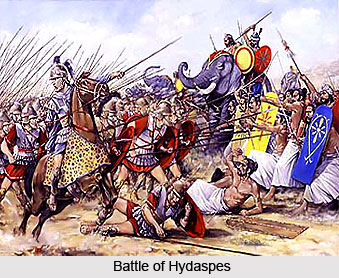 Alexander won the Battle of Hydaspes in 326B.C. This battle is also known as The Battle of the Hydaspes River. This battle took place on the east bank of Jhelum River. In order to move forward towards the east he had to defeat King Porus. Porus is considered as the most successful opponent of Alexander despite facing a defeat in the battle. This battle is also known for the tactics applied by both
Alexander won the Battle of Hydaspes in 326B.C. This battle is also known as The Battle of the Hydaspes River. This battle took place on the east bank of Jhelum River. In order to move forward towards the east he had to defeat King Porus. Porus is considered as the most successful opponent of Alexander despite facing a defeat in the battle. This battle is also known for the tactics applied by both
Causes of Battle of Hydaspes
Alexander required overcoming King Porus for moving towards east. There was an inborn rivalry between the two houses which came to a head when the threatened invasion of the country took place. The ruler of Taxila immediately decided to help Alexander.
Phases of Battle of Hydaspes
Alexander fixed his camp in the locality of the town of Jhelum on the right bank of the river. The army of King porous was standing on the opposite side and stationed posts at various points up and down the river in order to watch the enemy`s movements and give the alarm when he attempted to cross the river. The Paurava`s army consisted of 4,000 strong, all his chariots, 200 elephants, and 30,000 infantry. Alexander`s army comprised of heavy-armed Macedonian infantry carrying the long spear in phalanxes; and the highly disciplined cavalry. Alexander soon realised that it is impossible to cross the river in the face of a vigilant. He resorted to a different way. He at first diverted the attention of Porus by dividing his army into several columns with which he made frequent excursions in different directions. Simultaneously he sent out foraging parties into the country and gathered provisions in large quantities. This would lead the enemy to think that he intended to await a more favourable time when the melting of the snow on the mountains would stop, the river would be low and the crossing would be easier. The numerous tricks of Alexander kept Porus at first continually on the move in the nights and he became indifferent to the threats of crossing the river that never materialised.
Porus` men had become used to the noises on Alexander`s side of the river that the actual preparations for the crossing were carried out. The actual day that was chosen for the crossing was advanced by the news that Ambhi was notwithstanding his embassy to Takshasila. Alexander had planned skilfully.
He quietly moved his part of the army upstream and then crossed the river secretly. By mistake he landed on an island however soon crossed to the other side. Porus observed his opponent`s plot and sent a small cavalry and chariot force that was represented by his son on order to fight off Alexander. Porous wanted to prevent Alexander`s crossing. Alexander routed his opponent that led to the death of Porus` son. He understood that Alexander had crossed to his side of the river.
Porus reached the point where Alexander`s army was arranged. He deployed his forces and started the attack. Indian army was deployed on both flanks, their centre comprising infantry with elephants. The elephants caused harm to the Macedonian force but were resisted by the dense pikes of the phallangitai.
Alexander initiated the battle by sending horse archers to bombard the cavalry wing of King Porus. The Indian cavalry galloped to their hard pressed kinsmen. Coenus`s cavalry contingent appeared on the Indian rear at this time. The Indians tried to form a double military force but the complicated tricks brought more confusion. This made the Macedonian horse to conquer. The remaining cavalry fled among the elephants for protection. Meanwhile the phallangitai locked their shields and advanced upon the enemy. Porus put up a brave fight and surrendered thereby. The battle finally came to an end.
Aftermath of Battle of Hydaspes
The courageous attitude and war skills of Porus impressed Alexander. He allowed him to rule Hydaspes or Jhelum under Alexander`s name. Two cities were founded by him: one at the battle spot called Nicaea (Greek name for Victory) in commemoration of his victory and one on the other side of Jhelum called Alexandria Bucephalus in the honour of his faithful pony which died after this battle.
The battle is significant for opening up India for Greek political and cultural influence which continued for several centuries.






































